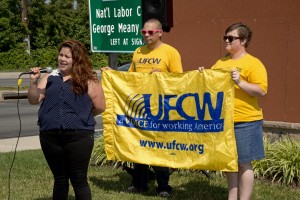Adapted from Local 400
After a decade of frozen salaries across the country, states are taking initiative, and pulling working families out of poverty by raising wages. However, the laws only benefit constituents when the community is part of putting them into practice and when the public is educated about their rights as workers regardless of immigration status. UFCW Local 400 and the Labor Council for Latin American Advancement (LCLAA) joined together Monday morning in Maryland with elected officials and community supporters at a local Safeway to kick off a week-long (June 16-20) education campaign aimed at bringing awareness to area employees on the new minimum wage laws, set to take effect Oct. 1, 2014.
“These new laws will provide a vital boost to hundreds of thousands of workers struggling with how to make ends meet,” said UFCW Local 400 President Mark Federici. “The Prince George’s and Montgomery county governments did their part to pass the laws, but it’s our job, starting today, to raise awareness to hold employers accountable and prevent wage theft in the future.”
November 2013, Prince George’s County was able to achieve a way overdue victory and set the tone, along with Montgomery County, for minimum wage increase statewide. The first increase to $8.40 per hour will be implemented by October 1, 2014 and steadily increase every year reaching $11.50 per hour by 2017. The implementation of the wage increases in these counties is higher than the state’s minimum wage, which is set to gradually increase to $10.10 by July 2018.
“Jobs should lift workers out of poverty, not trap them in poverty,” said Executive Director of LCLAA Hector E. Sanchez. “While we celebrate this important victory, we recognize that Latino workers suffer more minimum wage and overtime pay violations than any other ethnic group,” That is why we have joined this critical tour to ensure Latinos are not robbed of their hard earned wages. We want to make it clear to employees and employers that paying what the law requires is not negotiable.”
“I’ve worked my entire life, so I know how hard it is to try and make ends meet, especially off minimum wage,” said Jacqueline Midence (pictured), a four-year fast food industry worker. “When you’re supporting your family, every cent helps you survive.”
“The new law will help people like me live better, it will give us more hope for the future.”


